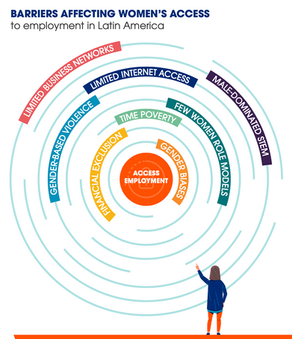Why EdTechs & HRTechs Are Uniquely Positioned to Drive Gender Equality
- Jul 24, 2023
- 2 min read
Updated: Jun 4, 2024
The following is a preview of content from two gender research reports prepared by ALIVE Ventures and Value for Women. Join our webinar on August 1st to be the first to receive the full reports and to hear reactions from experts from IFC, HolonIQ, BID Lab, and more.
The EdTech sector has been flagged as potentially one of the most powerful growth engines for Latin America & the Carribean (LAC), accelerating economic recovery, addressing inequalities, increasing access, and multiplying the support for and impact of LAC’s parents, mentors, teachers, and institutions.
The sector has demonstrated a clear ability to scale and internationalize, expanding dramatically in recent years to number more than 1,500 EdTech companies and over 4,500 jobs in 2021, and having attracted US $1B in investment over the past 10 years. Venture capital investment in LAC EdTech more than tripled between 2020 and 2021.
The HRTech sector seems to follow the same trend. In line with global patterns, the HRTech sector in Latin America has accelerated since the start of the pandemic, reaching a market size of US $1B in 2022 and expected to reach US $1.7B by 2028.
EdTechs and HRTechs are uniquely positioned to support gender inclusion. In the face of the immense gender challenges, EdTechs and HRTechs are supporting a successful transition to the future of work by helping learners develop a range of skills and credentials and access employment opportunities. The solutions HRTechs and EdTechs offer tend to be remote, flexible, highly accessible, and scalable, and as such, contribute to reducing some gender inequalities.

The ability to connect anytime from anywhere was the top benefit of online training women mentioned in our survey and focus groups.
In fact, Coursera, a global leading online courses provider, found that 60% of women caregiver users said they would postpone or not study at all in the absence of online learning.
Digital solutions can provide the easy access that time-strapped individuals need, offer more affordable training options than brick and-mortar options, and eliminate transportation costs to the user. They can also provide democratic access to job opportunities beyond one’s network.
But to realize the entirety of HRTechs’ and EdTechs’ potential to address gender gaps, they must do it intentionally with specific actions, products, and solutions to consider gender in their internal and external operations.
Outlined below are some of the EdTech and HRTech solutions in the market today that are powerfully reducing gender barriers to professional education and employment:

Interested in learning how we can help EdTechs and HRTechs take action via research-based recommendation to build such solutions?
Join us for the release of our gender research reports on August 1st where we will share these recommendations and be joined by experts from IDB Lab, HolonIQ, and IFC in discussion with ALIVE, Value for Women and Crehana to explore the full results from these first of their kind reports focused on Latin America.





